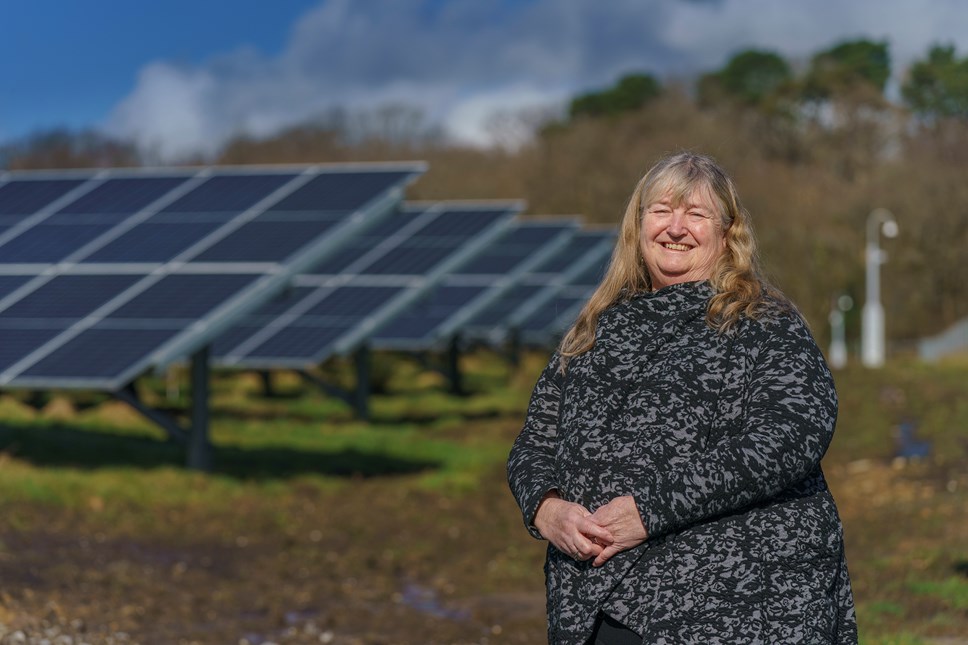
Solar farm powers Morriston Hospital for 50 hours without back-up from the grid in winter months
Fferm solar yn darparu pŵer ar gyfer Ysbyty Treforys am 50 awr heb ddefnyddio unrhyw bŵer wrth gefn o'r grid yn ystod misoedd y gaeaf
The UK’s first hospital-owned solar farm has surpassed expectations by providing enough electricity to not only contribute to the daily power needs of Morriston Hospital in Swansea, but to also cover 100% of its demand for 50 hours.
This is despite only operating during the shortest days of the year.
The £5.7m solar farm was built thanks to a loan scheme set up by the Welsh Government to decarbonise the public sector by 2030, and is repayable on an invest to save basis.
It is estimated that the hospital has already saved an estimated £120,000 in electricity bills since it was switched on in November, and is projected to save 1000 tonnes of carbon and £500,000 per year in bills when fully operational.
It has already produced 30,000 kWh surplus energy that’s been sold back to the energy grid at a profit to the hospital.
Visiting the 4MW project on Brynwhillach Farm, which is linked to Morriston by a 3km private wire, Minister for Climate Change Julie James said:
“We want our energy to come from community owned and locally run renewable energy sources in Wales.
“This will ensure our supply is resilient, reliable and reasonable for both our planet and our pockets.
“We have bold ambitions to decarbonise the public sector by 2030. Morriston Hospital- which depend not only on the powers of their staff, but also the energy hungry machines to keep their patients alive and well- have blazed the trail in their switch to renewables, which makes sense both financially and to the health of the people of Wales.
“Our addiction to fossil fuels is proving harmful, volatile and no longer viable. In Wales we will continue to accelerate our investment in renewable energy and energy efficient measures such as those adopted at Morriston hospital, and call on the UK Government to support a socially just transition to Net Zero as we respond to the climate emergency.
“The IPCC have rung the clarion call for our planet, now we must listen and respond to the science.”
Chair of Swansea University Health Board, Emma Woollett, said:
“I am delighted that the solar farm’s performance has already exceeded our initial expectations.
“The health board’s aim is to reduce its carbon footprint and maximise opportunities to use renewable energy sources.
“The solar farm will play an important part in achieving that aim, but there is also an additional benefit in terms of cost savings. It is not only lowering our electricity costs every day, but on some days covering 100% of our electricity needs.
“With the current volatile situation with energy prices, this really shows that the investment and the long-term thinking on behalf of the health board has paid off.”
Notes to editors
Notes to editors
Swansea Bay has received a total of £13.5 million through the Welsh Government Wales Funding Programme for the solar farm and other energy-saving and carbon-reducing measures. These measures include energy efficiency improvements such as lighting and insulation.
At the start of the project, electricity prices were around £0.13 per kilowatt hour (kWh) from the National Grid. On 10th March 2022 (am) this had risen to £0.25 per kWh
Morriston Hospital was using 20 Giga watt hours (GWh) of electricity a year. First phase of energy saving measures (pre solar farm) reduced this to 16 GWh pa, saving 4000 tonnes of carbon in the first phase.
Welsh Government has over a decade of track record in tackling fuel poverty by investing in improving the energy efficiency of the most inefficient homes of those on low incomes.
The Welsh Government Energy Service programme opened in July 2018. Through it we have supported 408 projects across Wales, saving 432,000 tonnes of CO2, and generating £212 million of local income and savings.
Net zero carbon status by 2030: public sector route map | GOV.WALES
The UN’s Intergovernmental Panel for Climate Change (IPCC) recently released its sixth assessment report which said that half of humanity was ‘highly vulnerable’ to the impacts of climate change : Outreach material — IPCC
